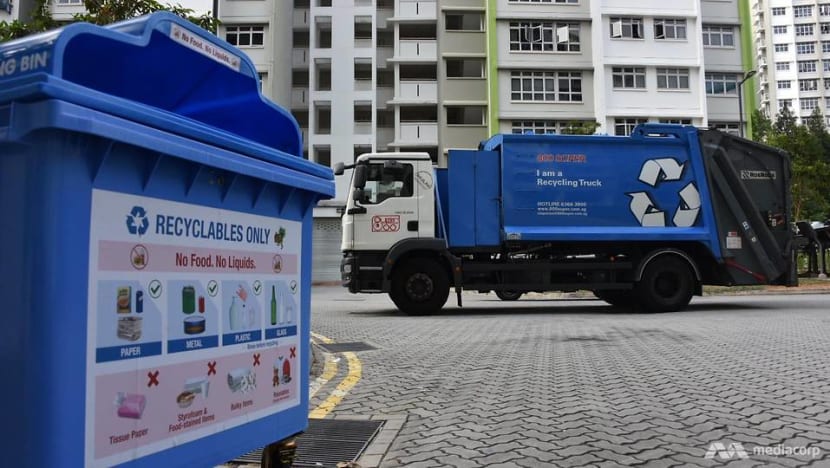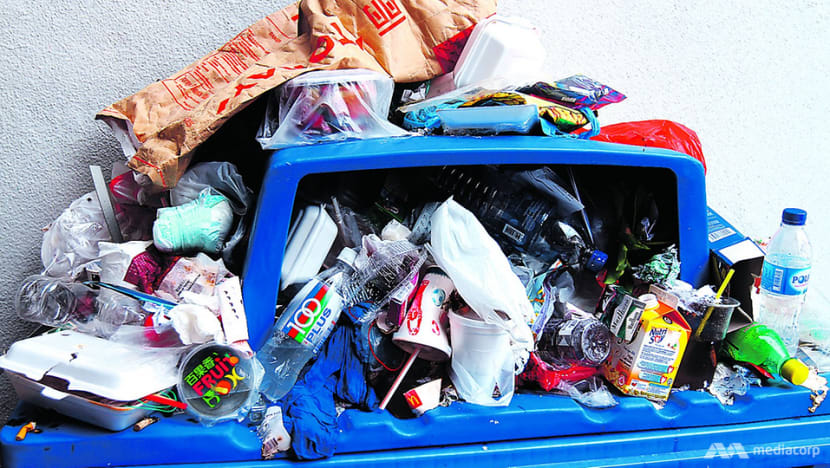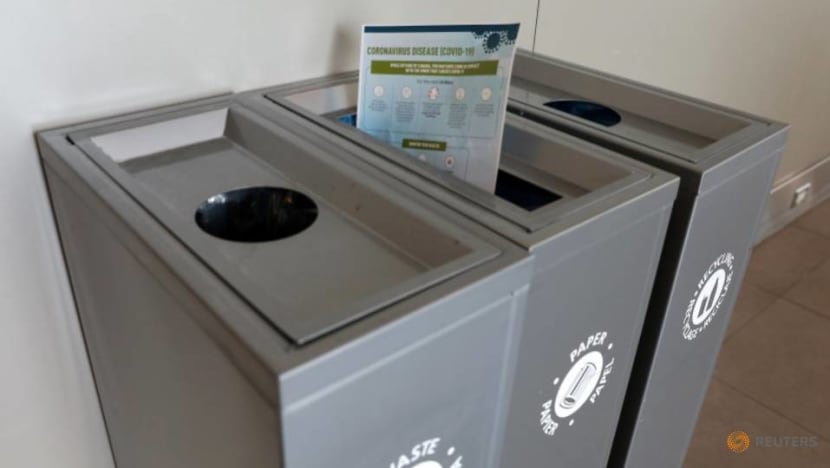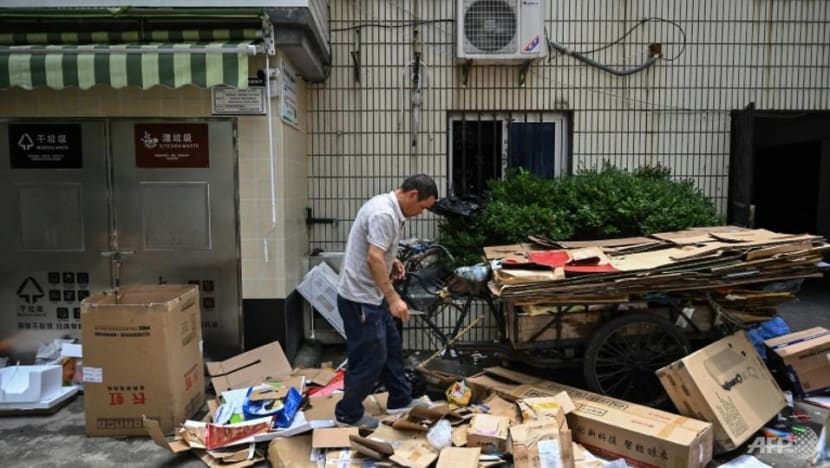commentary Commentary
Commentary: Why does Singapore still lack a recycling ethos?
As we move towards a much more green consciousness – with the Government taking the lead - this is a good time to ask why Singapore lags far behind Asian counterparts when it comes to sorting our waste, asks NUS’ Tong Yen Wah

Blue recycling bin with new label design unveiled on Friday, Aug 30, 2019, at the launch of Zero Waste Masterplan pictured next to 800 Super's blue recycling truck. (Photo: Darius Boey)
SINGAPORE: Having a tradition of being respectful to law and government expectations, Singapore has succeeded in reining in the COVID-19 situation.
However, the country is currently experiencing a waste “epidemic”. Singapore’s recycling rate has sat at a constant low. According to the National Environment Agency (NEA), the domestic recycling rate fell from 22 per cent in 2018 to 17 per cent in 2019.
This is despite proactive attempts by regulatory authorities to increase the numbers. These attempts have included a “Zero Waste” scheme which improves collection services of recyclable waste as well as incentive structures to encourage recycling.
READ: IN FOCUS: 'It is not easy, but it can be done' - The challenges of raising Singapore's recycling rate
Recycling companies and environmental activists have also been fairly active in promoting initiatives and providing public education about the benefits of recycling. Despite these efforts, why has the nation not yet formed a strong recycling ethos?
Are citizens simply unaware of the benefits of recycling? A survey we conducted in 2016 revealed that a majority of Singaporeans expressed strong support for environmental causes.
Perhaps the issue may lie more with the highly convenient means through which residents dispose their waste.
READ: Commentary: We are on the cusp of a plastic recycling revolution
GAPS IN RECYCLING WASTE
The centralised refuse chute (CRC), a typical mainstay of most HDB flats and high-rise condominiums, permits residents to dispose waste in the comfort of their own homes.
The ease of doing so likely discourages residents from expending additional effort bringing down their recyclables and depositing them in the bright blue recycling bins.
A common refrain comes from a typical comment like this one from a local resident: “If (there are) bulky items like carboards or big containers, I will bring down to put in the blue bins, but small items like small bottles/glass, I will just throw them from the chute … too troublesome to go downstairs to recycle them.”
The CRC is a uniquely Singaporean system designed to enable ease of waste disposal rather than ease of recycling.
READ: Commentary: Recycling bins are for recyclables, not junk

Such a disposal system, accessed from the comforts of your own home, is rarely found in other cities around the world.
In Japan, Taiwan and South Korea for instance, residents in high-rises have to bring their waste to central disposal bins on ground level where it can be collected by waste collectors.
Compounding the issue are common misconceptions about what can and cannot be recycled. This is problematic given how mixing in non-recyclable waste can counter-productively reduce the efficiency of the waste recycling process.
READ: Contamination of recyclables, incorrect recycling among possible factors for Singapore’s low domestic recycling rate: Experts
It is not that we don’t recycle – NEA figures show that over half of Singaporeans engage in recycling practices regularly but they do not have an exhaustive knowledge of what can be recycled or how to dispose of the recyclables properly.
Some misconceptions remain because there is no immediate feedback or corrective action to rectify wrong practices. For instance, when recycling bottles, they have to be washed first and then placed in a bin, but this is not usually done.
The mixing of food waste into a recyclables bin would render the entire bin unrecyclable.
A simple example is a greasy pizza box thrown in with clean cardboard boxes, or half-empty soft drink bottles mixed with empty plastic bottles.

The final gap is how despite taking the care to sort waste, during collection, it seems that all types of waste are transported and processed for disposal in the same manner.
Singaporeans, in letters to newspapers or in online forums, have noticed that recycling trucks only have one compartment for all recyclables even though many recycling bins have separate openings and bins for glass, paper and metal cans.
In this situation, it would appear that the hard work in separating these recyclables into the correct receptacle are wasted when the collectors then put all of them together in the same collection truck.
It is not widely known that this type of “single-stream recycling”, as it is commonly done nowadays, takes mixed recyclables to Materials Recovery Facilities where they are then sorted into the different categories of glass, plastic, paper, metals and more.
SIGN UP: For CNA’s Commentary weekly newsletter to explore issues beyond the headlines
WHAT CAN WE LEARN FROM OTHERS
Is Singapore hitting a glass ceiling in the environmental goals we can accomplish from voluntary recycling?
Looking outwards, most of our Asian neighbours have resorted to a strict enforcement of policy measures to boost recycling rates. Japan may be an ideal case study for how to cultivate a robust recycling culture; it too, started off by regulating and enforcing waste management and recycling polices.
READ: Commentary: Recycling makes you feel less guilty but doesn’t change how huge our plastic problem is
In the case of South Korea, they introduced a unit pricing strategy for household waste, known as the Volume-based Waste Fee System. Residents were required to purchase standard plastic bags for residual disposal where recyclables are collected at no extra charge.

The recycling rate increased drastically, driven by market-based incentives. In addition to these efforts, South Korea also launched a compulsory food waste recycling programme in 2013.
Today, the country’s food waste recycling rate has peaked at 95 per cent, a sharp increase compared to its 2 per cent in 1995.
In China, Shanghai has also started to mandate recycling practices in the middle of 2019. Acts of noncompliance would be met with a fine of up to 200 yuan (S$40).
READ: Commentary: Why recycling, less single-use plastics are not the answers to our plastic scourge
Enforcement came in the form of surveillance cameras, alongside an army of volunteers who assisted with the policy’s implementation across many residential estates.
Taking a page out from Japan’s playbook, the city’s recyclable collection was also conducted at fixed timings of the day and at fixed locations within the residential estate.
Shanghai’s policy implementation was not without hiccups. The policy, requiring citizens to bring their recyclables to assigned collection points, was largely viewed as an unnecessary hassle.
Citizens came up with an easy-to-follow Peppa Pig version for waste sorting. Household food waste refers to what is edible for the pig, whereas residual wastes are the non-edible ones.
Hazardous waste would poison the pig to death. Recyclables are things you can sell for money to purchase more pigs.
READ: Commentary: Wasteful practices of affluence must stop
Even though Shanghai has ways to go before they catch up with Japan and South Korea’s recycling rate, the improvements achieved in such a short period are nothing short of remarkable.
As Singapore continues to develop and urbanise, waste accumulation will continue to be a growing problem. The availability of solutions in neighbouring countries should galvanise Singapore to start taking bigger steps in pursuit of more effective waste management strategies.
In our current research, we explore the use of interventions to nudge residents into adopting positive waste recycling behaviours. Much like how our collective efforts of mask wearing and social distancing have enabled us to stem the spread of COVID-19, might we also be able to dedicate ourselves to the noble cause of protecting our environment?
We think we can, by taking a first step to sort and recycle our waste.
Listen to a conversation about recycling, repairing e-waste and the challenges of a consumerist culture on CNA's Heart of the Matter podcast:
Tong Yen Wah is an Associate Professor at the Chemical and Biomolecular Engineering, National University of Singapore.















